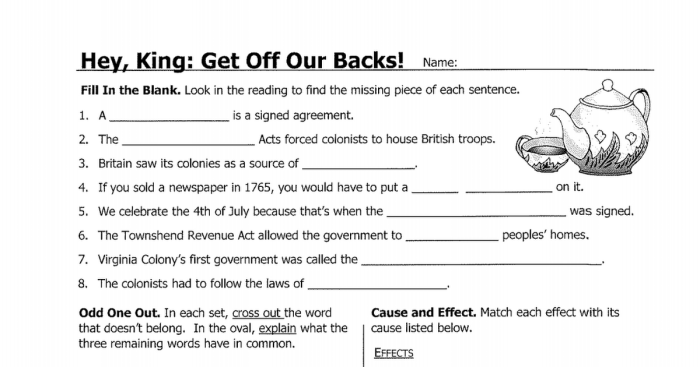Hey king get off our backs answers key – Unveiling the intricacies of the phrase “Hey king get off our backs,” this comprehensive guide delves into its origins, cultural significance, and multifaceted implications. Prepare to navigate the nuances of this powerful expression, exploring its impact on social interactions, alternative expressions, historical evolution, and contemporary relevance.
Through a captivating analysis, we unravel the phrase’s ability to shape power dynamics, serve as a tool for resistance, and adapt to evolving social norms. Join us on this linguistic journey, where we uncover the depths of “Hey king get off our backs” and its enduring presence in our cultural lexicon.
Contextualizing “Hey King Get Off Our Backs”
The phrase “Hey king, get off our backs” has its roots in the African American experience and has been used as a form of resistance and empowerment. It is often used to express frustration with authority figures or institutions perceived as oppressive or unjust.
Origin and Historical Significance
The phrase emerged during the civil rights movement of the 1960s as a way for African Americans to challenge the systemic racism and discrimination they faced. It was used in protests and speeches to demand equality and justice.
Cultural and Social Contexts
The phrase has since become a symbol of resistance and empowerment for marginalized communities around the world. It is used to challenge oppressive systems and demand social change.
The phrase has also been adopted by other groups who feel marginalized or oppressed, such as the LGBTQ+ community and indigenous peoples.
Impact on Social Interactions
Power Dynamics and Relationships
The phrase “Hey king, get off our backs” can have a significant impact on power dynamics and relationships. It can be used to challenge authority figures and demand respect.
However, the phrase can also be used in a disrespectful or aggressive manner, which can damage relationships.
Resistance and Empowerment
The phrase can be used as a form of resistance against oppression and injustice. It can empower individuals and communities to speak out against discrimination and demand change.
The phrase has been used in protests and social movements around the world to challenge oppressive regimes and demand human rights.
Alternative Expressions

Similar Meanings
There are several alternative phrases or expressions that convey a similar message to “Hey king, get off our backs.”
- Get off our case
- Leave us alone
- Stop harassing us
- Back off
Nuances and Differences
While these alternative phrases have similar meanings, there are some subtle nuances and differences between them.
For example, “Get off our case” may be perceived as more aggressive than “Leave us alone.” “Stop harassing us” is more specific and implies that the speaker is being harassed or bullied.
Evolution of Usage: Hey King Get Off Our Backs Answers Key
Historical Evolution
The phrase “Hey king, get off our backs” has evolved over time to reflect changing social and cultural norms.
In the 1960s, the phrase was used primarily by African Americans to challenge racial oppression. Today, it is used by a wider range of groups to challenge various forms of oppression and injustice.
Changing Connotations
The phrase has also undergone a shift in connotations over time. In the past, it was often seen as a disrespectful or aggressive statement.
However, in recent years, the phrase has been reclaimed by activists and social justice advocates as a symbol of resistance and empowerment.
Relevance in Contemporary Society

Continued Use, Hey king get off our backs answers key
The phrase “Hey king, get off our backs” continues to be used in contemporary society to challenge oppression and demand social change.
It is used in protests, social media campaigns, and other forms of activism.
Significance in Social and Political Discourse
The phrase has become an important part of social and political discourse in recent years.
It is used to challenge systemic racism, police brutality, and other forms of oppression.
Clarifying Questions
What is the origin of the phrase “Hey king get off our backs”?
The phrase originated in the African-American community as a response to oppression and discrimination.
How has the meaning of the phrase evolved over time?
The phrase has evolved from a specific call for resistance to a more general expression of frustration and dissatisfaction.
What are some alternative expressions that convey a similar message?
Alternative expressions include “Leave us alone,” “Stop bothering us,” and “Back off.”